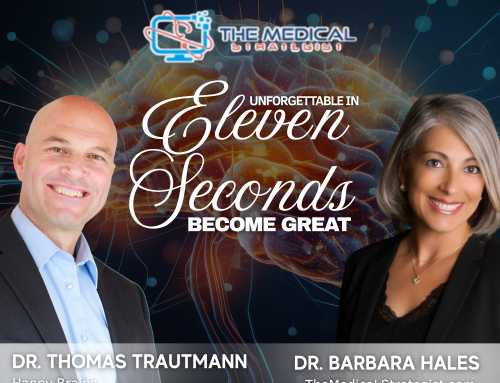Podcast: Play in new window | Download
Subscribe: RSS
In this episode of Marketing Tips for Doctors, host Dr. Barbara Hales interviews Stewart Gandolf, CEO of Healthcare Success, about what truly drives results in healthcare marketing. With over 30 years of experience leading campaigns for health systems, group practices, and telehealth providers, Stewart shares practical strategies that help medical professionals attract more patients and build trust.
From his early days navigating a skeptical industry—where even a Yellow Pages ad was considered controversial—to pioneering one of the first content marketing models for healthcare, Stewart discusses how consistent education, rather than sales tactics, is the key to winning doctors’ trust. He explains why credibility matters more than hype, and how thought leadership and clear ROI-based strategies are critical for growth.
The conversation covers essential marketing pillars: updated websites, solid phone support, patient reviews, content and video marketing, internal referrals, and paid search. Stewart also explains why many doctors hesitate to market themselves and how this hesitation often blocks long-term success.
Whether you run a solo practice or manage dozens of locations, this episode delivers smart, actionable insights on how to connect with more patients and run a more responsive, sustainable healthcare brand.
Key Takeaway:
“People judge what they can’t see based on what they can. A bad website is your cockroach in the kitchen—it turns people away before you ever know they were interested.” – Stewart Gandolf
Connect with Stewart Gandolf:
Website: www.healthcaresuccess.com
LinkedIn: linkedin.com/in/stewartgandolf
Podcast: Healthcare Success Podcast
Connect with Barbara Hales:
Twitter: @DrBarbaraHales
Facebook: facebook.com/theMedicalStrategist
Business website: www.TheMedicalStrategist.com
Email: info@TheMedicalStrategist.com
YouTube: TheMedicalStrategist
LinkedIn: www.linkedin.com/in/barbarahales
Books:
Content Copy Made Easy
14 Tactics to Triple Sales
Power to the Patient: The Medical Strategist
TRANSCRIPTION (205)
Welcome and Introduction
Dr. Barbara Hales (00:02) Welcome to another episode of Marketing Tips for Doctors. I’m your host, Dr. Barbara Hales, and today we have with us Stewart Gandolf. Stewart is a very interesting person that I think you would enjoy meeting. He’s led healthcare marketing programs for over three decades. Today, he is the CEO of Healthcare Success, which markets multi-location practices, health systems, telehealth and more. Welcome to the show.
Stewart Gandolf (00:33) Thank you so much. I’m really happy to be here and look forward to talking more.
Getting into Healthcare Marketing
Dr. Barbara Hales (00:38) How did you get into this program that you’re in? How did you get involved with it to begin with?
Stewart Gandolf (00:43) It’s actually a fun—at least from my point of view—origin story. I fell in love with marketing in undergrad and left engineering. I decided I wanted to work for agencies, and I worked my way up to J. Walter Thompson. We worked with Bally Total Fitness, which was an $80 million account in the 90s—a huge client even by today’s standards. But I got disillusioned with the big agency world. My print sales guy was making more money with less stress, so I got out and moved into commercial real estate. Timed it perfectly with the industrial real estate recession in LA and the riots. Meanwhile, a company kept reaching out to me that marketed to doctors. At the time I thought, “Doctors? How do you make money doing that?” I said no initially. A year later, I got hungrier and said yes for six months—ended up staying ten years and becoming VP of Marketing.
First Seminar and Public Speaking
Stewart Gandolf (01:57)
Five weeks into the job, I found myself at an Embassy Suites in Denver leading a three-day marketing workshop for doctors. I had never spoken in public before. I had the knowledge, so I was confident—and it worked. They liked me. Fun fact: I got stuck in the elevator on the way to my first speech.
Early Days of Medical Marketing
Stewart Gandolf (03:13) Back then, we sold a newsletter for $100, then upgraded customers to a seminar, then agency services. Marketing for doctors was new—no one was doing it in a smart or organized way. I was on the road twice a month, leading seminars. It gave me exposure to all types of specialties.
Legal and Ethical Resistance
Dr. Barbara Hales (04:10) What were the biggest challenges that you faced when starting out, and how did you overcome them?
Stewart Gandolf (04:16) The biggest challenge was perception. Marketing was illegal until 1977. Even into the early 90s, doctors didn’t think it was ethical. Some states only allowed a nameplate on the door—nothing more. Doctors would report each other to state boards over Yellow Pages ads. People would pay to hear me speak—and then argue that “you can’t do that.” But those that did market found massive opportunity. Some practices went from 4 to 1,000 locations.
Building Trust with Doctors
Dr. Barbara Hales (06:23) So how did you convince doctors that they needed marketing?
Stewart Gandolf (06:28) Doctors respect smarts and expertise—not sales pitches. If you say what they already know, they tune out. I got up to speed on each specialty weekly, and once I earned their trust, they would follow me to the airport still asking questions. It all came down to credibility, credibility, credibility.
Content Marketing Before It Was Called That
Dr. Barbara Hales (08:01) What are the top strategies you’ve used to market yourself, and how can doctors apply them?
Stewart Gandolf (08:17) We were doing content marketing before that term existed—offline newsletters, seminars, etc. After I left for a few years, I returned and co-founded a company with a 100% online model for client acquisition. I started blogging on day one. Got columns in Dental Economics, Medical Economics. We built a strong base—20,000 newsletter subscribers, now shifted more to LinkedIn followers. Content was, and still is, the foundation.
SEO and Thought Leadership
Stewart Gandolf (10:45) SEO is changing with AI tools and overviews. Building thought leadership helps with visibility. Doctors writing papers or doing interviews—if patients don’t know about it, it’s wasted. That’s where content distribution and repurposing come in.
Broader View of Marketing
Dr. Barbara Hales (12:02) Let’s talk about content marketing.
Stewart Gandolf (12:09) Content is part of thought leadership. But many doctors confuse marketing with just advertising. We break it into six categories: branding, digital marketing, traditional advertising, patient experience/internal marketing, referral building, and PR. Depending on the client, we do anything from paid search to full brand strategy.
The Power of Video Marketing
Dr. Barbara Hales (14:34) Video marketing is really important now, especially in healthcare.
Stewart Gandolf (15:06) Absolutely. Doctors can shoot basic video with an iPhone for local events or testimonials. But we also do professional video—like interviews or even commercials. It’s about choosing the right level and purpose of video.
Quick Wins for Doctors
Dr. Barbara Hales (16:44) If a doctor wants to improve marketing today, what’s one quick and impactful strategy they can implement?
Stewart Gandolf (16:53) Ask for patient referrals—it’s free but underused. Talk to referral sources. If investing, start with paid search. You get immediate control and results versus waiting for SEO. Paid search is scalable, testable, and highly targeted.
Common Marketing Mistakes
Dr. Barbara Hales (19:09) What’s a common mistake that health professionals make when marketing?
Stewart Gandolf (19:20) Chickening out too fast. Some ask how to cancel after 30 days—that’s a red flag. It takes time. Another mistake is focusing only on cost, not ROI. Or having no one internally to execute plans. Even with consultants, someone on the inside needs to move things forward.
Final Marketing Tips
Dr. Barbara Hales (20:49) Any final tip our listeners can use right away?
Stewart Gandolf (21:06) Make sure your website looks current and credible. People judge you based on it. If it looks outdated, they assume you are too. Reviews matter. Phones matter—most front desks are terrible. If you spend on marketing but don’t answer the phone well, you’re losing business. And of course, work with someone who lives and breathes this stuff—like you.
Closing Thoughts
Dr. Barbara Hales (23:01) It’s amazing how many doctors still don’t have a website.
Stewart Gandolf (23:09) Right. And even if they do, many haven’t updated it in years. Patients wonder—did this doctor retire? A bad website is like seeing a cockroach in a restaurant. You judge everything else based on that.
Dr. Barbara Hales (25:37) Well, it’s been a pleasure speaking with you today. This has been another episode of Marketing Tips for Doctors with your host, Dr. Barbara Hales, speaking with Stewart Gandolf. Until next time—bye.



